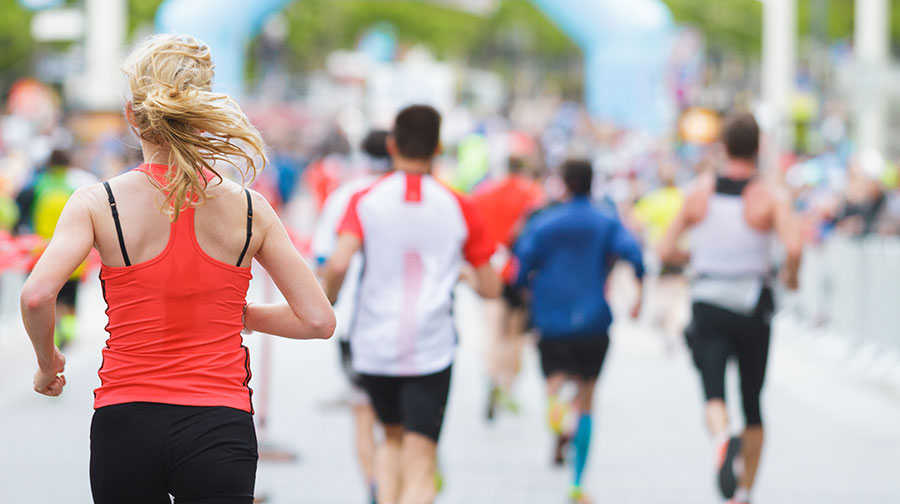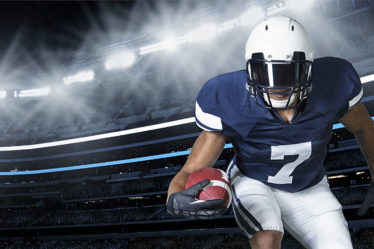
Marathon or distance running involves road and cross-country runs of long distances including 10km, 15km, half marathon (21.1km) and the full marathon (42.2km). With different races taking place all over the world at different times, elite distance runners follow a highly “periodized” training program.
According to Wikipedia, Periodized Training is defined as:
Runners using this type of training can cover up to an average of 150 km in a week, depending on the event and their current training phase. Recreational runners train weekly distances of 50-100km for fitness throughout the year.
For a marathon runner, either at the elite level or for recreational purposes, dietary strategies can significantly influence performance and stamina. Nutritional factors include fluid and electrolyte balance, availability of carbohydrate for fuel, and lactic acid accumulation from anaerobic efforts. Increasing and/or supplementing muscle fuel stores before and during a race will help raise performance levels in longer races – full or half marathon.
Elite runners usually have lean and compact physiques with low upper body muscle density and low body fat levels. These traits are very important to runners as they help produce an efficient running style as well as aid in body temperature regulation necessary for optimal performance in a race.
Hydration needs
Marathon runners need to stay well hydrated to perform optimally during a race. Hence, athletes need to drink enough fluid each day to replace amounts lost by the demands of long-distance training. The need for fluid replacement depends on factors such as prevailing temperature, a runner’s sweat rate, exercise intensity, duration, and altitude. It is not practical to replace all fluid losses during a training session or race but you should aim to replace approximately 100 to 150% of the fluid volume lost over the next 4 to 6 hours following the event.
For distance runners, regular intake of fluids should be a lifestyle. This is important in order to always stay well hydrated. Apart from carbohydrate depletion, dehydration is another key factor that can cause fatigue during competition or training.
As an athlete, you need to develop habits of taking fluids with and in between meals as well as snacks. To prevent dehydration, athletes will have to drink amounts that compensate for sweat rate and body metabolism. Planning your fluid intake by calculating the amount you are required to consume and carrying a water bottle with you at all times is a great way to ensure you stay hydrated.
According to https://www.sportsdietitians.com.au/:
Pre-race diet requirements and examples
The storage of adequate muscle fuel (glycogen) is necessary to ensure runners can be in optimal shape for training and competition. A pre-event meal provides a good opportunity for a final top off of glycogen stores. When having an early morning race, where time is scarce, an athlete can take a light, low fiber carbohydrate-rich snack 1-2 hours before the race.
These are some suitable pre-event light snack ideas:
- Apple Slices With Peanut Butter
- Whole Wheat Crackers and String Cheese
- Bananas
- Energy or Cereal Bars
- Fruit and Protein Smoothies
- Plain Yogurt With Fresh Fruit
- Chocolate Milk
- Hard-Boiled Eggs
- Dates
If there is more time available, you can have a larger meal 3-4 hours before the start of the event, followed by a small snack closer to the race start. It is important to put these meals to the test in training before taking part in a long race.
Here are some suitable examples:
Baked Eggs With Sweet Potato Hash and Spiced Pumpkin Seeds
Walnut Sweet Potato Bread
Avocado Toast with Hard-Boiled Egg
Ham, Cheese, and Cauliflower “Muffins”
Baked Avocado with Eggs
Homemade Breakfast Granola
Cranberry Pistachio Maple Oatmeal
For those involved in longer distances — half marathon and longer, the priority should be given to consuming carbohydrates. Carbohydrate loading over the 24-48 hours before the event can help increase much-needed glycogen stores. This improves fuel availability during the race.
Stomach upset during hard runs is common among athletes. You should, therefore, consume low fiber foods, reduce high protein or high-fat foods and use compact liquid carbohydrate foods over the last 12-24 hours before the event.
Diet requirements during an event and examples
During a competition, there is usually an increased need for additional fuel (carbohydrate) for stamina and performance. Having 30-60g of carbohydrate per hour is recommended for half marathon or longer events. This helps prevent muscle fatigue and maintain pace as well as cognition. Athletes should consume easy-to-digest carbohydrate-rich options with minimal fat, fiber or protein, as these slow down digestion. Performance foods such as gels, sports bars, energy chews, and sports drinks are suitable choices as they are easy to carry on the run track. Look out for carbohydrate sports drinks available at aid/hydration stations located throughout an event. This will help you meet both carbohydrate and fluid needs at the same time.
Post-race Diet Requirements and Examples
High-intensity training sessions, races, and long runs deplete glycogen stores in the body, so consuming a carbohydrate-rich meal/snack soon after finishing a run will help you recover faster. Apart from carbohydrates, the recovery meal should also include protein, fats, and plenty of fluids. Ideally, an amount of approximately 20 to 25g of high-quality protein should be eaten to aid with muscle repair. Healthy fats will help reduce inflammation, while fluids (predominantly water) help rehydrate and replace fluid losses.
Aim for nutrient-rich whole foods. The following are some recovery food suggestions you can use:
Marathon Running Nutrition Best Practices
Running on an empty stomach is common for many runners, while others follow the recommended pre-event meals that provide the adequate stores of glycogen necessary for endurance. Generally, requirements for carbohydrate, protein, vitamins/minerals, as well as fluids would vary depending on the training phase. Each athlete’s carbohydrate intake should reflect their daily training load. That means increasing total carbohydrate and energy intake during high-volume days and decreasing intake when volume and intensity are reduced during recovery/rest periods.
It is recommended that nutrient-rich carbohydrate foods like whole grain bread and cereals, starchy vegetables and fruit be prioritized to meet an athlete’s fuel demands. Additionally, carbohydrate-rich foods and fluids like sports drinks and energy gels can also be incorporated into your diet to raise performance level in intense training periods.
Demanding endurance training plans that involve daily or twice-daily sessions require sufficient fuel and recovery strategies to prevent fatigue. Some distance runners aim to have low body fat stores in order to improve performance, but restrictions in the form of a low-fat diet can lead to disordered eating, nutritional deficiencies, hormonal imbalances, fatigue, and even injuries.
The starting point will be to figure out what nutrition plan works best for you. This includes not only what you eat but when you eat it as well.
For professional athletes, it is recommended that they consult with a sports dietician to detail a comprehensive nutritional and hydration plan well before race day.
Example diets from marathon celebrities
Two-time Division-I All-American in Cross Country Jeff Gaudette, who also competed professionally for 4 years after college, has revealed his training diet plan and how it has helped him excel as a runner. Jeff has been running for 13 years. He has competed all over the world, in numerous marathons, and has recorded Olympic Trials qualifying times.
He is the first to admit that finding an effective diet for a runner is an individualized journey. A runner’s nutritional regiment is not as simple as a template to follow day after day. The reason for this is that each individual’s training and nutritional demands are different based on variations in mileage, intensity, running experience, and their respective goals. Each runner’s body also responds differently to foods at different times.
Jeff has shared information on food that has helped him succeed as an elite runner:
Prepare food in advance so that you have them on hand when required
Eat foods you enjoy but make sure they are nutritionally dense
Make sure you get enough calories
After meeting your nutritional needs, it is okay to have a few “bad foods” to reward yourself for the hard work of training
Jeff reveals the meals he consumes in a typical day as follows:
Pre-run meal
“Typically, I start my mornings with one serving of oatmeal mixed with 1 scoop of whey protein and a glass of water.
For what it’s worth, I find mixing cookies and cream whey protein with oatmeal tastes just like the flavored stuff you can buy, but without the sugar.
I like to add the protein to this meal because it helps halt the catabolic process that occurs when you sleep for eight to nine hours with no fuel.”
For the latter stages of the marathon training schedule, he sometimes takes toast with peanut butter and jelly for some extra fuel.
Post-run Recovery Drink
Jeff takes yogurt with granola or a power bar and Gatorade on normal, easy run days. But after harder workouts or a long run, he takes a recovery drink which contains nutrients that would support and refuel the muscles and body systems.
Breakfast
Eggs — three regular eggs and three egg whites — with black beans, spinach, cheese and salsa with a bagel.
Whole wheat pancakes, either with the above meal or alone, after long runs topped with yogurt and fruit or syrup
“Since the nutritional needs had been met with foods eaten earlier in the day, one of my favorite things was stopping at the donut shop if the run was at a trail I had to drive to,” Jeff adds.
Lunch
Grilled chicken wrap with spinach, avocado, and salsa
Snack
Cereal
Smoothies (when there’s time to prepare them)
Blend yogurt with orange juice, granola, wheat germ, frozen fruit
Dinner
Salmon with brown rice and asparagus
Chicken with sweet potato and broccoli
Pasta with homemade sauce
Every athlete should adhere to good nutrition practices as much as they adhere to proper training as these are two of the most important factors that determine performance on race day.



